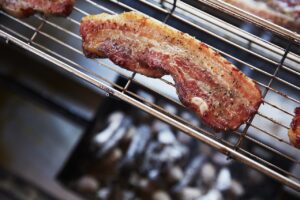Key Takeaways
- Keeping your griddle clean and in good repair is essential for maintaining its efficiency and prolonging its lifespan.
- Regularly cleaning and seasoning your griddle will prevent build-up and ensure even heat distribution.
- Using the right tools and techniques, such as scraping, scrubbing, and using cleaning solutions, will help remove stubborn dirt and grease.
- Taking proper care of your griddle, including protecting it from rust and storing it correctly, will contribute to its longevity.
A clean and well-maintained griddle not only ensures safe and healthy cooking but also enhances the overall cooking experience.
Whether you are a professional chef, a backyard grilling enthusiast, or a kitchen novice, it is essential to keep your griddle clean and in good repair. In this article, we’ll explore effective methods and tips to help you achieve just that.
Cleaning Your Griddle: The Basics
Before we delve into the specifics, let’s start with the basics of cleaning your griddle. The following steps should be performed after each use to maintain cleanliness:
- Remove excess grease: Using a heat-resistant scraper or spatula, remove any excess grease or food debris from the griddle surface. This step will prevent a sticky residue from forming and ensure a cleaner cooking surface for your next use.Cleaning TipTip: Scrape the griddle while it’s still warm (not hot) for easier removal of grease and food particles.
- Scrub the surface: Once the excess grease has been removed, scrub the griddle surface with a stiff grill brush or stainless steel scrubber. This will help remove any remaining residue and prepare the griddle for a thorough clean.Cleaning SolutionMix equal parts water and vinegar to create a natural cleaning solution. This combination is effective in breaking down grease and removing tough stains.
- Wipe down the griddle: After scrubbing, use a clean cloth or paper towel to wipe down the griddle surface and remove any residue or cleaning solution. This step will leave the griddle clean and ready for seasoning.
Seasoning Your Griddle: The Importance
Seasoning your griddle is an essential step in maintaining its cooking performance and preventing rust. Seasoning creates a protective layer on the griddle surface, making it non-stick and enhancing its durability. Follow these steps to season your griddle:
- Apply oil: Pour a small amount of high smoke-point oil, such as canola or vegetable oil, onto the griddle surface. Spread the oil evenly across the entire surface using a paper towel or heat-resistant brush.Seasoning TipTip: Avoid using olive oil or butter for seasoning, as they have low smoke points and can create a sticky surface.
- Heat the griddle: Turn on the griddle to a medium-high heat setting and allow the oil to heat up. Heating the oil will cause it to bond with the griddle surface, creating a seasoned layer.Safety NoteNote: Ensure proper ventilation while heating the griddle to avoid the build-up of fumes.
- Repeat the process: Repeat the oil application and heating process 2-3 times to build a strong seasoning layer. Each time you season, you are enhancing the non-stick properties of your griddle.
Deep Cleaning for Stubborn Dirt and Grease
Despite regular cleaning and seasoning, griddles can accumulate stubborn dirt and grease over time. Periodic deep cleaning is necessary to keep your griddle in optimal condition. Here are some effective methods for tackling stubborn grime:
- Hot soapy water soak: Fill a sink or basin with hot soapy water and immerse the griddle surface for a few minutes. This will help loosen dirt and grease, making them easier to remove.Cleaning TipTip: For effective cleaning, cover the griddle with a damp cloth after soaking in hot soapy water. This will create steam and further aid in loosening the dirt.
- Use a cleaning solution: If the hot soapy water soak is not sufficient, try using a specialized griddle cleaning solution. These solutions are specifically formulated to break down stubborn grease and dirt.Cleaning SolutionLook for cleaning solutions that are safe for your griddle’s surface and follow the manufacturer’s instructions for optimum results.
- Scrub with a griddle brick or pumice stone: For tough, burnt-on residue, a griddle brick or pumice stone can be effective. Using gentle pressure, scrub the griddle surface in circular motions to remove the stubborn dirt.Cleaning TipTip: Make sure to use a griddle brick or pumice stone suitable for your griddle’s surface type to avoid scratching or damaging it.
Remember, always rinse and wipe down the griddle surface after deep cleaning to remove any cleaning solution or residue.
Protecting Your Griddle from Rust and Storing Correctly
To ensure the longevity of your griddle, it’s important to protect it from rust and store it correctly when not in use. Here are some tips to keep your griddle in good repair:
- Dry thoroughly: After cleaning, ensure the griddle is completely dry before storing. Moisture can lead to rust formation, which can damage the griddle’s surface.Storage TipTip: To speed up the drying process, place the griddle on a low heat setting for a few minutes to evaporate any remaining moisture.
- Apply a light coat of oil: Before storing your griddle, apply a thin layer of oil to the surface to protect it from moisture and potential rust. Use a cloth or paper towel to evenly spread the oil.Storage TipTip: Re-apply a thin coat of oil before using the griddle again if it has been stored for an extended period to ensure it remains well protected.
- Choose a suitable storage location: Store your griddle in a cool, dry place away from direct sunlight and moisture. If space allows, consider covering the griddle with a protective cover to further safeguard it.Storage TipTip: Avoid storing the griddle near corrosive materials or chemicals to prevent accidental damage.
By following these tips and incorporating regular cleaning and maintenance into your griddle routine, you can enjoy the benefits of a clean and well-maintained griddle for years to come.
